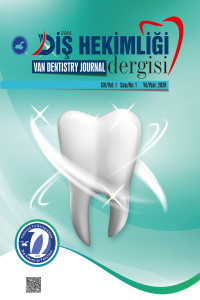Büyüme Gelişim Döneminde Maksiller Yetmezliğe Bağlı Sınıf III Bireyde Mini-Plak Ankrajlı Yüz Maskesi Uygulaması
Genellikle maksiller yetmezlikle
karakterize olan iskeletsel sınıf III anomaliler
sosyal ve çevresel faktörlerin etkisiyle bireyler
ve evebeynleri tarafından özellikle büyüme
gelişim döneminde farkedilmektedir.
Günümüzde iskelestel sınıf III anomalilerin
tedavisinde sıklıkla yüz maskesi
kullanılmaktadır. Konvansiyonel yüz maskesi
uygulaması, ankraj ünitesi ile bireyin vertikal
yönde büyümesinde istenmeyen değişimlere
neden olabilmektedir. Bu noktada istenmeyen
dentoalveolar etkileri en aza indirmek
amacıyla maksilla protraksiyonu, yüz
maskesinin iskeletsel ankraj üniteleri ile
birlikte kullanımıyla elde edilebilmektedir. Bu
olgu sunumunun amacı büyüme gelişim
döneminde olan maksiller yetmezliğe bağlı
sınıf III anomaliye sahip bireyin mini-plak
ankrajlı yüz maskesi uygulaması ile iskeletsel,
dentoalveolar ve yumuşak dokudaki
değişimlerinin sunulmasıdır.
Anahtar Kelimeler:
İskeletsel sınıf III, maksiller yetmezlik, iskeletsel ankraj
Application of Mini-Plate Anchored Face Mask in Class III Individual Due to Maxillary Deficiency During the Period of Growth and Development
Individuals and parents are
noticed by skeletal class III anomalies, which
are typically characterized by maxillary
insufficiency, especially during the growth and
development due to the influence of social and
environmental factors. Today, in the treatment
of skeletal class III anomalies, face masks are
frequently used. Conventional application of
the face mask may cause undesirable changes
in the growth of the individual with the
anchorage unit in the vertical direction. At this
point, it is possible to achieve maxilla
protraction by using the face mask together
with skeletal anchorage units to minimize
undesired dentoalveolar effects. The aim of
this case report is to present, by applying a
face mask with mini-plate anchorage, the
skeletal, dentoalveolar and soft tissue changes
of an individual with class III anomaly due to
maxillary insufficiency in the growth and
development period.
Keywords:
Skeletal class III, maxillary deficiency, skeletal anchorag,
___
- 1. Williams S, Andreasen CE. The Morphology of Potential Class III Skeletal Pattern in Growing Child. Am J Orthod Dentofacial Orthop. 1986; 89: 302-11.
- 2. Ellis E, McNamara JA Jr. Components of Adult Class III Malocclusion. J Oral Maxillofac Surg. 1984;42(5):295-305.
- 3. Joshi N, Hamdan AM, Fakhouri WD. Skeletal Malocclusion: a Developmental Disorder with a Life-long Morbidity. J Clin Med Res. 2014;6(6):399-408.
- 4. Bernabé E, Sheiham A, de Oliveira CM. Condition-specific Impacts on Quality of Life Attributed to Malocclusion by Adolescents with Normal Occlusion and Class I, II and III Malocclusion. Angle Orthod. 2008;78(6):977- 82.
- 5. Kaya D, Kocadereli I, Kan B, Tasar F. Effects of Facemask Treatment Anchored with Miniplates After Alternate Rapid Maxillary Expansions and Constrictions; a pilot study. Angle Ortho. 2011;81: 639-46.
- 6. Şar Ç, Arman-Özçırpıcı A, Uçkan S, Yazıcı AC. Comparative Evaluation of Maxillary Protraction with or without Skeletal Anchorage. Am J Orthod Dentofacial Orthop. 2011;139: 636-49.
- 7. Vaughn GA, Mason B, Moon HB, Turley PK. The Effects of Maxillary Protraction Therapy with or without Rapid Palatal Expansion: a prospective, randomized clinical trial. Am J Orthod Dentofacial Orthop. 2005;128(3):299-309.
- 8. Kilicoglu, H. and Kirlic, Y. Profile Changes in Patients with Class III Malocclusions After Delaire Mask Therapy. American Journal of Orthodontics and Dentofacial Orthopedics. 1998; 113(4): 453-462.
- 9. Ngan, P. Early Timely Treatment of Class III Malocclusion. Seminars in Orthodontics. 2005;11(3):140–145.
- 10. Zhou YH, Ding P, Lin Y, Qiu LX. Facemask Therapy with Miniplate Implant Anchorage in a Patient with Maxillary Hypoplasia. Chin Med J. 2007;120(15):1372- 5.
- 11. Delaire J. Maxillary Development Revisited: Relevance to the Orthopaedic Treatment of Class III malocclusions. Eur J Orthod. 1997;19 (3):289- 311.
- 12. Hegmann M, Rüther AK. The Grummons Face Mask as an Early Treatment Modality within a Class III Therapy Concept. J Orofac Orthop. 2003;64(6):450-6.
- 13. Nanda R. Biomechanical and Clinical Considerations of a Modified Protraction Headgear. Am J Orthod. 1980;78(2): 125-139.
- Başlangıç: 2020
- Yayıncı: Van Yüzüncü Yıl Üniversitesi
Sayıdaki Diğer Makaleler
Dik Yön Boyutları Yüksek Olan Genç Hastada Hızlı Üst Çene Genişletmesi
Saadet ÇINARSOY CİĞERİM, Seda KOTAN
İntraoral Patolojilerin İncelenmesi: 3 Yıllık Retrospektif Çalışma
Sema KAYA, Alaettin KOÇ, Yusuf Rodi MIZRAK, Serap KESKİN TUNÇ
Murat TUNCA, Yeşim KAYA, Levent CİĞERİM, Yasemin TUNCA
Alt ve Üst Çene Tam Dişsiz Hastalarda Rezidüel Kret Genişliğinin Değerlendirilmesi
Zeynep Dilan ORHAN, Levent CİĞERİM, Mehmet GÜZEL, Mohammad Saleem AL SMADİ, Gönül DİNÇ
Saadet ÇINARSOY CİĞERİM, Gönül DİNÇ, Hüseyin Melik BÖYÜK, Helin DURSUN
Serap KESKİN TUNÇ, Nazlı Hilal KAHRAMAN
Diş Hekimliğinde Diagnostik ve Terapötik Ultrasonografi Kullanımı
